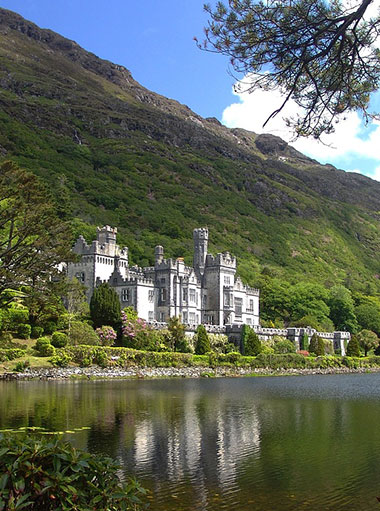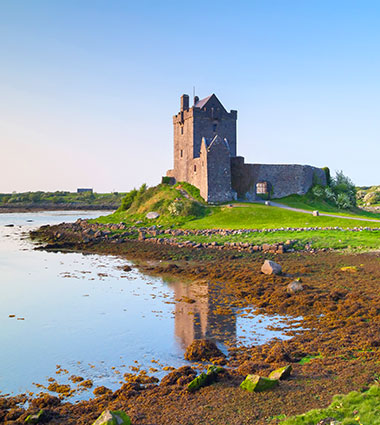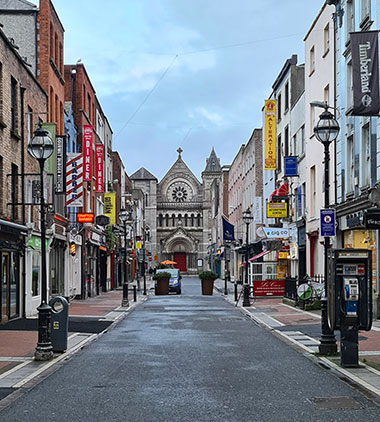Travel > Europe > UK > IrelandIrelandExploring the Emerald IsleIreland is a delightful country and is renowned for its timeless charm, warm hospitality, and storied destinations that promise to enthrall you and provide authentic Celtic experiences. Here are a few of the best places and most picturesque and culturally rich locations in Ireland. The island of Ireland is split into two regions: the Republic of Ireland, and Northern Ireland. The Republic of Ireland, is an independent sovereign state it is not considered part of the UK, (although we have included it here for geographical proximity reasons when planning your travel). The Republic of Ireland is a member of the European Union, and so uses the Euro as their currency. Northern Ireland, on the other hand is part of the United Kingdom and so is NOT part of the EU and therefore uses the British Pound Sterling as their currency. Dublin: Ireland's Vibrant Capital
Killarney: Nature's Paradise
Galway: A City of Culture and Heritage
Dingle: Coastal Charm and Marine Wonders
Cork: A Culinary and Cultural Delight
Waterford: A Window to Ireland's Viking Past
Limerick: Where History and Nature Collide
Best Time to Visit:The best time to visit Ireland ultimately depends on your interests and the experiences you seek. Each season has its unique charm, so choose the one that aligns with your preferences and expectations. Keep in mind that Ireland's weather can be unpredictable, so be prepared for rain at any time of the year. Spring (March to May): Spring in Ireland is a time of awakening. The landscape bursts into vibrant greenery, and flowers bloom across the countryside. It's a great time for outdoor activities like hiking, biking, and exploring national parks. Don't miss the St. Patrick's Day celebrations on March 17th, which feature parades and festivities throughout the country. Summer (June to August): Summer is the warmest and most popular season in Ireland. The weather is at its best, making it ideal for exploring coastal areas like the Cliffs of Moher and trying water sports in the Atlantic. You can also immerse yourself in Irish culture by attending music festivals and various cultural events held across the country during this season. Autumn (September to November): Autumn in Ireland is a picturesque season as the foliage changes to stunning shades of red, orange, and gold. It's a great time to explore historical sites such as castles and ancient ruins, including Blarney Castle and the Rock of Cashel. Food enthusiasts will appreciate the seasonal delicacies at various food festivals, such as the Dingle Food Festival. Winter (December to February): Although winters in Ireland are relatively mild, the country takes on a festive atmosphere during this season. Cities like Dublin come alive with Christmas markets, decorations, and holiday spirit. If you prefer indoor attractions, you can explore museums, galleries, and cozy pubs, such as the Guinness Storehouse and the Book of Kells in Trinity College. The Wild Atlantic Way, while less popular in winter, still offers dramatic coastal scenery for those willing to explore. Travel Planning Tips:Visiting Ireland is an opportunity to embrace a unique culture, stunning landscapes, and vibrant cities. By planning ahead and being mindful of these tips, you can make your trip to the Emerald Isle a truly memorable experiencePlan Ahead: Before embarking on your Irish adventure, take the time to research the cities, regions, and attractions that pique your interest. Create a list of the must-see places and plan your itinerary accordingly. Ireland is rich in history, culture, and natural beauty, so be sure to tailor your trip to your preferences. Cash and Currency: The Republic of Ireland uses the Euro as their currency. Northern Ireland, on the other hand uses the British Pound Sterling as their currency. Make arrangements with your bank ahead of time to inform them about your travel plans. This helps prevent any unexpected issues with your credit or debit cards. While cards are widely accepted, it's a good idea to carry some cash, particularly for small purchases and in more rural areas where card acceptance might be limited. Also, keep in mind the local tipping customs, especially in restaurants and for services like taxis. Travel Insurance: Ensure that you have comprehensive travel insurance that covers medical expenses, trip cancellation, and any potential emergencies. Review the policy details and know how to access medical assistance if needed. Check Visa Requirements: Depending on your nationality, you may need a visa to enter Ireland. Check visa requirements well in advance and apply if necessary. Make sure your passport remains valid for at least six months beyond your planned departure date. Pack Accordingly: Ireland's temperate climate can be unpredictable. Pack clothing that suits the season of your visit. An umbrella is a valuable travel companion, and dressing in layers allows you to adapt to varying conditions, even within the same day. Given the amount of walking you'll likely do while exploring cities and attractions, comfortable walking shoes are essential. Don't forget to bring a universal power adapter for charging your electronic devices. Local Etiquette: When in Ireland, respect the local customs and etiquette. The Irish are known for their friendliness, and it's good practice to queue (stand in line) in an orderly fashion. Be polite in your interactions with locals and engage in the warmth of Irish hospitality. In traditional Irish pubs, it's common to order and pay for your food and drinks at the bar, so you can immerse yourself in the true Irish pub experience. Accommodations:Hotels: Ireland boasts a wide selection of hotels, ranging from luxurious to budget-friendly options. Many hotels in Ireland are conscious of the needs of older travelers and provide amenities such as lifts, accessible rooms, and on-site restaurants. You can inquire about potential senior discounts or special rates when booking your stay. Guesthouses and Bed & Breakfasts: Guesthouses and B&Bs in Ireland offer a warm and intimate experience. They are often operated by local hosts who provide personalized service and a cozy atmosphere. Staying at a guesthouse or B&B allows retirees to interact with locals and immerse themselves in authentic Irish hospitality.. Spa and Wellness Resorts: For retirees seeking relaxation and wellness-focused experiences, Ireland has its share of spa and wellness resorts. These establishments offer a range of rejuvenating treatments, thermal baths, and relaxation facilities. Consider staying in one of these retreats in picturesque regions like County Kerry, County Clare, or the Wild Atlantic Way, where you can unwind in natural beauty. Transportation:Ireland offers a wide range of transportation options to suit different travel preferences and needs, whether you prefer the convenience of public transportation, the flexibility of driving, or a mix of both to explore this beautiful country. Here's some helpful information for getting around in Ireland:LEAP Card: Dublin, the capital of Ireland, has its own contactless smart card for public transport called the "Leap Card." The Leap Card can be used on buses, trams (LUAS), DART (Dublin Area Rapid Transit) trains, and some commuter rail services in the Greater Dublin area.The Leap Card offers the convenience of touch-and-go travel and can be preloaded with credit for various travel needs. You can order a Leap card online via the LEAP card web site or obtain one from transportation hubs such as airports, DART stations, tram stops or retailers. Domestic Flights: While Ireland is relatively small, domestic flights are available for longer journeys or travel to remote regions like the Aran Islands or Donegal. Airlines like Aer Lingus and regional carriers operate these routes. Flying can save time for more distant destinations, but it may not always be the most budget-friendly option for shorter trips. Trains: Ireland has a well-established train network, operated by Iarnród Éireann (Irish Rail). Trains connect major cities and regions, offering a convenient and scenic way to explore the country. Consider purchasing rail passes for extended travel, and booking tickets in advance is advisable, especially for peak times and long-distance routes. Buses: Buses are a popular mode of transportation for regional and local travel in Ireland. Bus Éireann is the primary operator, serving cities and rural areas. You can also find private bus companies that offer routes to specific destinations. Similar to trains, booking tickets in advance is recommended, and bus services are cost-effective for reaching areas that may not have direct train connections. Rental Cars: There are several international and local car rental companies operating in Ireland, including well-known brands like Hertz, Avis, Europcar, Enterprise, and Budget. You can find rental offices at major airports, cities, and popular tourist destinations. Remember that in Ireland and Northern Ireland, driving is on the left side of the road. Cars usually have the steering wheel on the right side so you may need to adjust to this. The road network is well-maintained, including motorways (M-roads) and national routes (N-roads). Be prepared for narrower and winding roads, especially in rural areas. Ireland has many roundabouts, which are common traffic features. Familiarize yourself with roundabout rules and understand the proper lanes to use when approaching and exiting them. Taxis: Taxis in Ireland are generally safe and reliable. Look for licensed taxis with a taxi sign on the roof and a taxi meter inside. Fares are typically based on distance traveled, with additional charges for luggage or late-night rides. Taxis in Ireland typically accept both cash and credit cards. Tipping is customary and often involves rounding up the fare or offering a small additional amount. Public Transportation: Irish cities have efficient public transportation systems, including buses and trams. Dublin, for example, has the DART (Dublin Area Rapid Transit) and LUAS tram system, while other cities have their own networks. Tickets can usually be purchased from ticket machines or from the driver. Consider day passes or multi-day passes for unlimited travel within specific cities or regions. Safety Tips:
|
 Kylemore Abbey, Connemara, County Galway Kylemore Abbey, Connemara, County GalwayPhoto by Hans Hansen / Pixabay  Dunguaire Castle, Galway Bay, near Kinvara Dunguaire Castle, Galway Bay, near KinvaraPhoto by Kwiatek7 / Adobe Stock  Dublin Street Dublin StreetPhoto by Zeeshan Kundi / Pexels | |||||||||||||||||||||||||||||